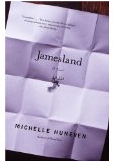Jamesland by Michelle Huneven


This is such a good novel. Such wonderfully quirky and likeable characters. Alice and Pete and Helen. If I could, I’d invite them all over for dinner, together. I’d ask Pete if maybe he’d consider cooking.
Pete’s an excellent cook—a professional chef. (Think dishes like lamb tagine with dried figs. Or plum tart with lemon sorbet.) But he’s also a chef very much down on his luck. He’s lost his restaurant, his wife, and visitation rights with his young son. He’s had some anger issues. A suicide attempt. Now he’s forty-six years old and living with his widowed mother, a nun, who has been given a leave of absence from her convent in order to help him get back on his feet.
Here is the passage in which Ms. Huneven deftly introduces us to Pete at the beginning of Chapter three.
Not wanting to disturb his mother, Pete decides not to make coffee before setting out on one of his long walks through Los Feliz, along the river, asking the question he asks over and over throughout the novel: How do people live in this world?
Pete has issues. But he’s working on them. This is Pete trying to sit still.
Meditation with a light and realistic and terribly human touch. Now that I like.
Thankfully, Pete’s meditation teacher, Helen Harland, a Unitarian Universalist minister, is not one to take herself too seriously either. We’re introduced to her two chapters later as she sits at her church on a folding chair next to the podium, watching and listening to a small Ecuadorian band. Here’s a window into Helen’s mind as she sits on her folding chair:
She hadn’t wanted Ecuadorian or any other musicians, but how could one balk when a congregant in good standing actually volunteered to do something? She could’ve said no, that she did not care for Ecuadorian bands, having heard them all over France last summer, whistling and chuffing to the wee hours in the plaza of every small town until even the briefest scrap of their music only evoked nights of lost sleep. She could also have said that she’d made a solemn promise upon becoming a Unitarian Universalist minister that she would avoid at all costs any service that could double as a skit on Saturday Night Live. If Helen had learned anything in her sixteen months at Morton, however, it was to pick her battles.
Over and over in this novel, Ms. Huneven plays off the title by William James: The Varieties of Religious Experience. Religion as a kind of variety show—but presented with a light and compassionate touch.
And the third character in this variety show? Alice. The descendant of William James with whom we first enter the novel. Alice wakes, in the prologue, to the sound of skidding furniture. She gets out of bed, goes into the dining room and sees, on the other side of the table, “a furry shoulder, a long neck and large, pricked ears.” A deer. In the dining room. Real? Not real? Spiritual visitor?
Here’s Alice on the telephone the next morning trying to tell her mother about the visitor:
“Any damage?” [her mother asks.]
“No, I got it out right away. But it shook me up.”
“I would think so,” Mary said. “Though I’m not really surprised, not with the way you leave doors wide open for all and sundry to wander in.”
In less than a minute, he’d said good-bye.
It’s humor that makes this book so delightful. I’d say that Ms. Huneven has a wonderful sense of humor, but maybe it would be fairer to say that she has a sense of humor close enough to mine that I can appreciate it. I do appreciate it. This is a novel about spiritual quest—three characters on different and intertwining spiritual quests—but all of this done in such a large way and with such a light hand. And with this delightful sense of laughter bubbling up underneath.
If, like me, you like to have a good novel on reserve, like money in the bank, consider getting this one—–and then
pull it out one day like a treat—-like healing food——
